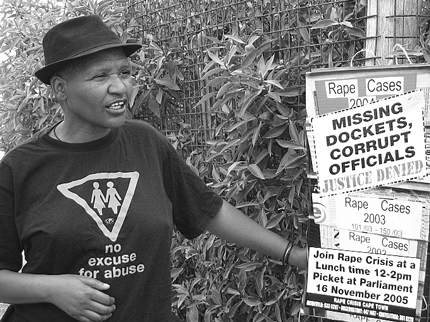Shorts show progress and a long road ahead
Funeka Soldaat is a South African woman who’s determined to live life her way. Although she is expected to look feminine, she flaunts her masculinity. After people warned her that having a lesbian wedding in her community would be like committing suicide, she told her street committee she would be getting married..
“I didn’t ask permission. I just told them,” she says. And she’s not afraid to take on the intimidating South African government in order to get justice for victims of rape.
Soldaat is the subject of Martha Qumba’s “Ndim’ Ndim,’” one of five documentaries that will be screened in the New
York African Film Festival’s “Out in South Africa” shorts program, co-presented with NewFest. “Ndim’ Ndim’” is the best film in the program, and probably the best short documentary you’ll see all year. The film’s only flaw, if you can call it that, is its short running time; Soldaat is so fascinating, that “Ndim’ Ndim’” flies by way too fast.
Fanney Tsimong’s “… Silenced” proves why people like Soldaat are so desperately needed. This documentary focuses on how South Africa shortchanges its male rape victims. In South Africa, male rape is not considered rape, although it is still considered a crime. However, men might face prejudice if they tell the police they’ve been raped. As a result, men may not feel comfortable going to the authorities. So it’s hard to keep track of how big a problem male rape is in South Africa.
The most memorable person in “… Silenced” is Tebogo Motswai, a transgendered man. Motswai has it easier than some other transgendered men, because people are used to seeing transgendered men where he lives. He can dress as a woman, then, and not be harassed. But he’s also had some difficult traumas to recover from. He was raped and left with an STD that required an operation. Director Tsimong artfully captures the poor man’s sadness, yet also lets us see his hopefulness.
It is an anonymous woman—a lesbian who dresses as a man—who stands out in Zanele Muholi’s “Enraged by a Picture,” a film about a controversial University of Cape Town photography exhibit the director contributed to.
The film doesn’t show this woman doing anything particularly special, yet the footage of her is captivating anyway—I was amazed that she was willing to bind her breasts so tightly, and that she was able to get away with cross-dressing without anyone bothering her.
Muholi should have forgotten about filming the exhibition and just focused on this woman. The film drags when she isn’t in it.
“Enraged” is also confusing. Muholi never tells us if this woman was one of the subjects of the exhibition. We don’t know if the woman wants to dress as a man, or if she feels she has to, so she can be accepted as a masculine lesbian by society. And, as mentioned before, Muholi never reveals the subject’s name. That’s particularly frustrating, considering we get the names of far less interesting subjects. But maybe the woman asked if she could be anonymous, so that she would not be found out.
“Two Moms,” directed by Luiz DeBarros and Andile Genge, is the worst film in the series. This 48-minute documentary, the longest in the shorts program, is about Anna-Marie de Vos and Suzanne du Toit. Their names may ring a bell because they were in the news a while back when they won the right for gay couples to adopt in South Africa.
If “Two Moms” were only about the couple’s battle, the film might have been good. But this documentary is weighed down with unnecessary details about the women’s home life, which is annoyingly charmed. Probably, the directors were trying to show that a two-mom family can be normal too. Still, the same point could have been made without boring us to death.
Phybia Dlamini’s “Outlaw Culture” looks at how poorly the South African media treats gays. Daniel Somerville, a worker with Behind the Mask, an African gay media organization, believes that journalists are not homophobic, but, rather, heterosexist—in other words, they act as if gays aren’t reading their articles. I think he’s being too kind—I definitely got the feeling from watching this film that the South African media is homophobic.
According to “Outlaw Culture,” queers are regularly degraded in the media because of their sexuality—even if they are, or were, well respected in their fields. The late Brenda Fassie was a beloved singer whose bisexuality was scrutinized by the South African media. Fassie’s love for women was even associated with her drug-taking. And when respected queer professor William Papo was killed, journalists obsessed about his sex life as well. But they were crueler to him than they were to Fassie. In fact, his killers got more respect in the press than he did.
While most of the films in this series are very good, the take-home message isn’t—although people are trying to make the situation better in South Africa, it still isn’t a great place for queers. Then again, neither is America.
gaycitynews.com



































